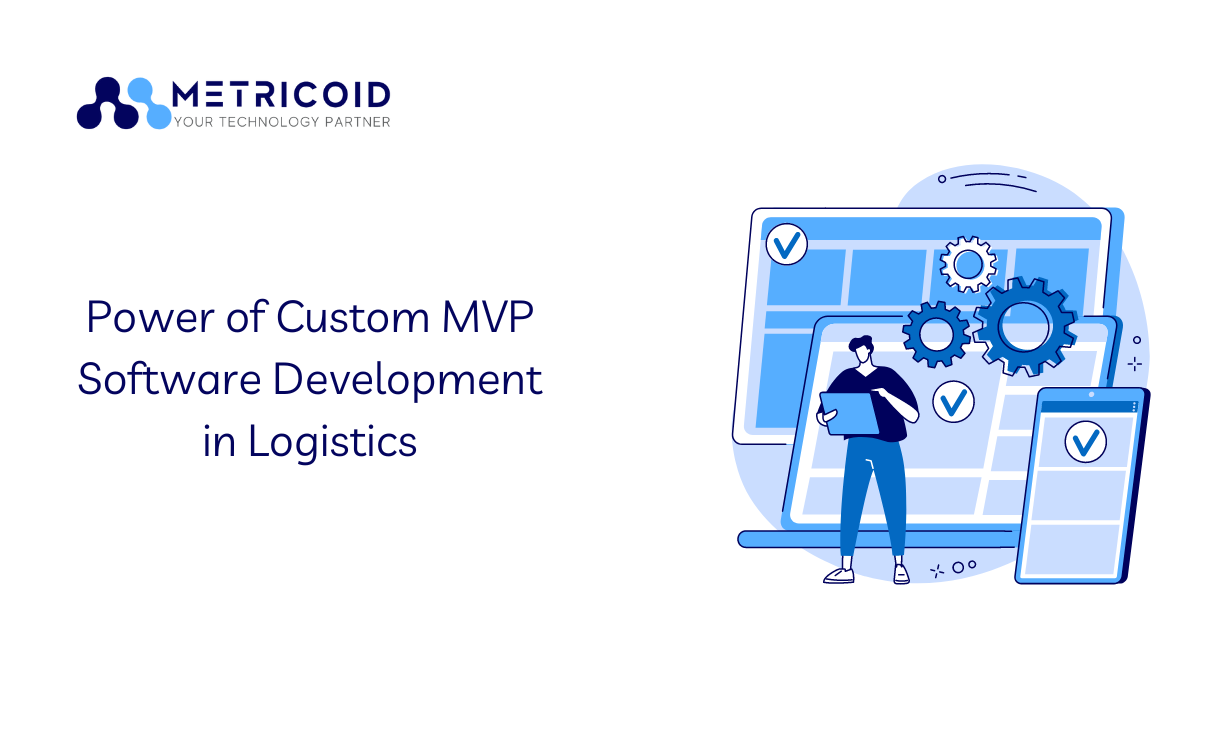Power of Custom MVP Software Development in Logistics

Table Of Contents
Introduction
In the ever-evolving world of logistics, efficiency, and accuracy are paramount. As companies aim to enhance their operational workflows, they often find themselves at a crossroads between traditional methods and innovation. This is where Minimum Viable Product (MVP) software development enters the scene, promising to revolutionize the way logistics companies operate.
Understanding MVP Software Development
MVP software development is the process of creating a simplified version of a software product that caters to the primary needs of its users. This version, while basic, provides enough functionality to validate a product concept and gather user feedback for future improvements. By adopting an MVP approach, logistics companies can tailor their software solutions, incorporating only the essential features needed to address their unique challenges.
Advantages of Custom MVP Software Development in Logistics
Cost-Effective:
MVP software development allows companies to cut down on unnecessary features, thus saving on development costs. It enables a lean approach, where the software is built incrementally, reducing the risk of financial losses from untested, large-scale implementations.
Faster Time-to-Market:
Developing an MVP software allows logistics companies to deploy a workable solution faster. This speed to market can be crucial in the competitive logistics industry, providing a competitive advantage.
User Feedback and Iterations:
MVP software enables real-time feedback, allowing logistics companies to make informed decisions and iterations based on actual user responses. This helps in refining the software and ensuring it is intuitively designed to solve the users’ actual problems.
Risk Mitigation:
By testing a product early in its development phase, logistics companies can identify potential issues or failures, mitigating the risk of large-scale problems down the line.
Enhanced Customer Satisfaction:
A custom MVP software, designed specifically for a logistics company’s needs, leads to more efficient operations. This efficiency inevitably translates into better service delivery, enhancing customer satisfaction.
Real-World Impact of MVP Software Development in Logistics
To comprehend the tangible impact of MVP software development, consider the statistical data from a 2022 survey by the Supply Chain Management Review. According to the survey, companies that implemented custom MVP software reported a 37% improvement in operational efficiency and a 29% reduction in cost overruns compared to their counterparts who relied on traditional, feature-heavy software solutions.
By providing a solution tailored specifically to the needs of the company and its customers, custom MVP software ensures that logistics operations are lean, efficient, and effective. With the added benefits of cost reduction, quicker deployment, and the opportunity for continuous improvement based on real-time feedback, the business case for MVP software development in logistics is compelling.
Harnessing Data with Custom MVP Software in Logistics
In addition to the advantages mentioned above, custom MVP software development can also significantly enhance a logistics company’s data handling capabilities.
In the commercial world, data is the new oil, and logistics is no exception. Every procedure in a logistics operation creates a variety of data, from inventory management to delivery scheduling. Companies may successfully harness this data with bespoke MVP software, resulting in a comprehensive, data-driven decision-making framework that promotes operational efficiency and increases customer happiness.
For example, an MVP software can be created to focus on real-time inventory tracking. This not only enhances openness for the organization and its clients, but it also gives useful information on transit times, possible bottlenecks, and inefficiencies in the supply chain. Logistics businesses may adopt strategic improvements to their operations by analyzing this data, ultimately lowering costs and enhancing service delivery.
Furthermore, MVP software can integrate predictive analytics tools, allowing logistics organizations to better estimate demand, manage inventory, and optimize their supply networks. A predictive analytics MVP can analyze historical and real-time data to forecast future trends using machine learning techniques.
This capacity to foresee changes and make educated judgements may give a considerable competitive advantage in the fast-paced and frequently unpredictable world of logistics. It also enables businesses to respond to interruptions more rapidly, minimizing their impact and delivering a more steady and dependable service for customers.
Overall, by emphasizing data management and analytics in the creation of bespoke MVP software, logistics organizations may unleash the full potential of their operational data, resulting in better informed decision-making, increased efficiency, and improved customer experience. And, given the rapid developments in data analytics technology, this is a growing area of opportunity in the future.
As the logistics sector evolves, businesses are increasingly looking for solutions that provide flexibility, scalability, and creativity. Custom MVP software development provides these businesses with an exciting road forward, allowing them to pioneer unique solutions that address their individual demands and concerns.
One of the most compelling aspects of custom MVP software development is its ability to drive innovation. By starting with a simple, functioning version of a software solution, logistics companies can continuously iterate and adapt their software based on real-world feedback and changing market dynamics. This dynamic approach to software development enables companies to remain at the forefront of industry trends and technological advancements.
In the context of logistics, this could mean developing an MVP software that incorporates cutting-edge technologies such as artificial intelligence (AI), machine learning, or blockchain. For example, AI and machine learning algorithms could be used to optimize route planning, reducing fuel costs and delivery times. Similarly, blockchain technology could be used to enhance supply chain transparency and traceability, providing clients with unprecedented insights into the journey of their goods.
Such an innovative approach not only provides logistical companies with a competitive edge but also allows them to offer unique value to their clients. By being able to provide a differentiated service, logistics companies can attract and retain more customers, driving their overall business growth.
Scaling Operations with Custom MVP Software Development
Scalability is another key benefit of bespoke MVP software development. Unlike traditional, one-size-fits-all software solutions, MVP software may be scaled up or down to meet the individual demands of a business. Because of its versatility, it is a perfect option for logistics organizations of all sizes.
An MVP software provides a cost-effective alternative for smaller logistics organizations to digitize their operations without requiring a large upfront investment. They may begin with a simple version of the program and then add functionality as their company grows and their needs change.
The scalability of MVP software allows bigger logistics organizations to test novel solutions on a smaller scale before spreading them out throughout their whole operations. This not only lowers the risk of installing new software, but also assures that any new solutions are extensively tested and polished prior to full-scale implementation.
The scalability of an MVP software also enables logistics companies to adapt to changing market conditions. Whether it’s a sudden surge in demand, the emergence of new industry regulations, or the development of new technologies, logistics companies can quickly and easily modify their MVP software to accommodate these changes. This adaptability is crucial in the fast-paced world of logistics, where the ability to respond quickly to change can often mean the difference between success and failure.
At a time when the logistics industry is undergoing rapid transformation, custom MVP software development provides a flexible, scalable, and innovative solution to the challenges facing logistics companies. It allows them to stay ahead of industry trends, adapt to changing market conditions, and deliver exceptional service to their clients. As such, it’s not just a beacon of hope, but a powerful tool for driving the future of logistics.
With these considerations, it is clear that the future of logistics hinges on the adoption of innovative, efficient, and user-focused strategies. Custom MVP software development not only checks all these boxes but also promises a future where logistics companies can navigate their challenges more easily and unlock new opportunities for growth and excellence. This is the future that every logistics company should aspire to, and it’s a future that’s within their grasp if they choose to embrace the power of custom MVP software development.
Conclusion
Custom MVP software development is a ray of hope for logistics organisations navigating the digital age’s obstacles. It is altering the logistics environment by providing an efficient, cost-effective, and user-centric approach, opening the way for innovation and excellence in service delivery.
Consider MVP software development if your logistics firm is looking for a competitive advantage. Accept the power of simplicity, customization, and innovation, and watch your logistics operations skyrocket.






